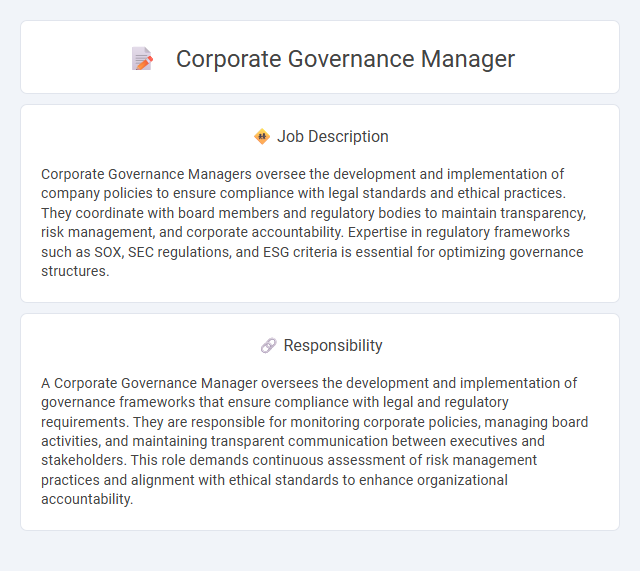
Corporate Governance Managers oversee the development and implementation of company policies to ensure compliance with legal standards and ethical practices. They coordinate with board members and regulatory bodies to maintain transparency, risk management, and corporate accountability. Expertise in regulatory frameworks such as SOX, SEC regulations, and ESG criteria is essential for optimizing governance structures.
Individuals with strong analytical skills and a keen eye for detail are likely to be well-suited for the role of Corporate Governance Manager. Those who thrive in structured environments, can navigate complex regulatory frameworks, and possess excellent communication abilities will probably find this position fitting. Conversely, people who struggle with multitasking or adapting to evolving compliance standards may face challenges in this role.
Qualification
A Corporate Governance Manager typically requires a bachelor's degree in business administration, finance, law, or a related field, with many employers preferring a master's degree or professional certification such as CPA, CFA, or CGEIT. Strong knowledge of regulatory frameworks, risk management, compliance standards, and corporate governance principles is essential. Proven experience in stakeholder communication, policy development, and ethical decision-making supports effective oversight of corporate governance practices.
Responsibility
A Corporate Governance Manager oversees the development and implementation of governance frameworks that ensure compliance with legal and regulatory requirements. They are responsible for monitoring corporate policies, managing board activities, and maintaining transparent communication between executives and stakeholders. This role demands continuous assessment of risk management practices and alignment with ethical standards to enhance organizational accountability.
Benefit
A Corporate Governance Manager likely enhances organizational transparency and accountability, contributing to improved stakeholder confidence. They probably help mitigate risks by ensuring compliance with legal and regulatory frameworks. Their role may lead to more efficient decision-making processes and long-term business sustainability.
Challenge
The role of a Corporate Governance Manager likely involves navigating complex regulatory environments and ensuring compliance with evolving legal standards, which presents significant challenges. Managing stakeholder expectations while maintaining transparency and ethical practices may require continuous strategic adaptation. Balancing risk management with corporate performance objectives could also be a probable difficulty faced in this position.
Career Advancement
A Corporate Governance Manager oversees compliance with regulatory frameworks and implements best practices to enhance organizational accountability. Mastery of risk management, stakeholder communication, and legal standards opens pathways to senior executive roles such as Chief Compliance Officer or Board Secretary. Continuous professional development and certifications like ICG or GCG propel career progression within corporate governance.
 kuljobs.com
kuljobs.com